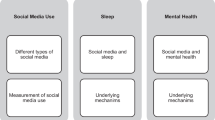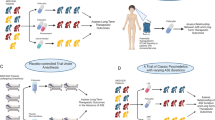Abstract
Purpose of Review
Sleep disturbance has received growing attention as a transdiagnostic factor that may contribute to multiple forms of psychopathology, including obsessive-compulsive disorder (OCD). The extant literature regarding the role of sleep disturbance in OCD is rapidly developing. This review integrates the findings related to sleep and OCD over the past year and highlights important areas for future research.
Recent Findings
Results indicate impaired sleep in those with OCD versus healthy controls and link sleep disturbance to OCD symptom severity in multiple samples. Findings from the past year also implicate cognitive control as a potential mechanism in this relationship. Finally, a recent treatment outcome study suggests that sleep disturbance may limit treatment response in pediatric OCD.
Summary
Findings from the past year contribute to the robustness of the small, but growing body of literature linking sleep disturbance to OCD. These results highlight the importance of incorporating sleep disturbance into extant models of OCD and suggest that consideration of the biopsychosocial effects of sleep disturbance may offer novel insight into the etiology and treatment of OCD.
Similar content being viewed by others
References
Papers of particular interest, published recently, have been highlighted as: • Of importance
Baglioni C, Nanovska S, Regen W, Spiegelhalder K, Feige B, Nissen C, et al. Sleep and mental disorders: a meta-analysis of polysomnographic research. Psychol Bull. 2017;142:969–90. https://doi.org/10.1037/bul0000053.
Benca RM, Obermeyer WH, Thisted RA, Gillin JC. Sleep and psychiatric disorders: a meta-analysis. Arch Gen Psychiatry. 1992;49:651–68.
Harvey AG, Murray G, Chandler RA, Soehner A. Sleep disturbance as transdiagnostic: consideration of neurobiological mechanisms. Clin Psychol Rev. 2011;31:225–35.
Nota JA, Sharkey KM, Coles ME. Sleep, arousal, and circadian rhythms in adults with obsessive–compulsive disorder: a meta-analysis. Neurosci Biobehav R. 2015;51:100–7. https://doi.org/10.1016/j.neubiorev.2015.01.002.
Insel TR, Gillin JC, Moore A, Mendelson WB, Loewenstein RJ, Murphy DL. The sleep of patients with obsessive-compulsive disorder. Arch Gen Psychiatry. 1982;39:1372–7.
Voderholzer U, Riemann D, Huwig-Poppe C, Kuelz AK, Kordon A, Bruestle K, et al. Sleep in obsessive compulsive disorder: polysomnographic studies under baseline conditions and after experimentally induced serotonin deficiency. Eur Arch Psychiatry Clin Neurosci. 2007;257:172–82. https://doi.org/10.1007/s00406-006-0708-9.
Storch EA, Murphy TK, Lack CW, Geffken GR, Jacob ML, Goodman WK. Sleep-related problems in pediatric obsessive-compulsive disorder. J Anxiety Disord. 2008;22:877–85. https://doi.org/10.1016/j.janxdis.2007.09.003.
Ivarsson T, Skarphedinsson G. Sleep problems and cognitive behavior therapy in pediatric obsessive-compulsive disorder have bidirectional effects. J Anxiety Disord. 2015;30:28–33. https://doi.org/10.1016/j.janxdis.2014.12.009.
• Donse L, Sack AT, Fitzgerald PB, Arns M. Sleep disturbances in obsessive-compulsive disorder: association with non-response to repetitive transcranial magnetic stimulation (rTMS). J Anxiety Disord. 2017;49:31–9. https://doi.org/10.1016/j.janxdis.2017.03.006. Those with OCD report and exhibit increased sleep disturbance compared to healthy controls. rTMS non-responders reported increased baseline sleep disturbance compared to treatment responders.
Yu CKC. Obsessions at night: dream experiences, emotional attributes, and personality traits as indicators of sleep problems. Sleep Hypn. 2016;18:30–40. https://doi.org/10.5350/Sleep.Hypn.2016.18.0106.
Cox RC, Olatunji BO. Sleep disturbance and obsessive-compulsive symptoms: results from the national comorbidity survey replication. J Psychiatr Res. 2016;75:41–5. https://doi.org/10.1016/j.jpsychires.2016.01.007.
Nota JA, Schubert JR, Coles ME. Sleep disruption is related to poor response inhibition in individuals with obsessive-compulsive and repetitive negative thought symptoms. J Behav Ther & Exp Psychiatr. 2016;50:23–32. https://doi.org/10.1016/j.jbtep.2015.04.011.
• Cox RC, Cole DA, Kramer EL, Olatunji BO. Prospective associations between sleep disturbance and repetitive negative thinking: the mediating roles of focusing and shifting attentional control. Behav Ther. 2017; https://doi.org/10.1016/j.jbtep.2015.04.011. Subjective sleep disturbance predicts obsessions over 6-months, controlling for baseline obsessions, and this relationship is mediated by focusing attentional control.
Gregory AM, Caspi A, Eley TC, Moffitt TE, O’Connor TG, Poulton R. Prospective longitudinal associations between persistent sleep problems in childhood and anxiety and depression disorders in adulthood. J Abnorm Child Psych. 2005;33:157–63. https://doi.org/10.1007/s10802-005-1824-0.
Neckelmann D, Mykletun A, Dahl AA. Chronic insomnia as a risk factor for developing anxiety and depression. Sleep. 2007;30:873–80.
Alvaro PK, Roberts RM, Harris JK, Bruni O. The direction of the relationship between symptoms of insomnia and psychiatric disorders in adolescents. J Affect Disorders. 2017;207:167–74. https://doi.org/10.1016/j.jad.2016.08.032.
McClung CA. How might circadian rhythms control mood? Let me count the ways. Biol Psychiatry. 2013;74:242–9. https://doi.org/10.1016/j.biopsych.2013.02.019.
Chamberlain SR, Blackwell AD, Fineberg NA, Robbins TW, Sahakian BJ. The neuropsychology of obsessive compulsive disorder: the importance of failures in cognitive and behavioural inhibition as candidate endophenotypic markers. Neurosci Biobehav R. 2005;29:399–419. https://doi.org/10.1016/j.neubiorev.2004.11.006.
Pauls DL, Abramovitch A, Rauch SL, Geller DA. Obsessive–compulsive disorder: an integrative genetic and neurobiological perspective. Nat Rev Neurosci. 2014;15:410–24. https://doi.org/10.1038/nrn3746.
McEwen BS, Karatsoreos IN. Sleep deprivation and circadian disruption: Stress, allostasis, and allostatic load. Sleep Med Clin 2015; 10:1–10. doi:https://doi.org/10.1016/j.jsmc.2014.11.007.
Ingiosi AM, Opp MR, Krueger JM. Sleep and immune function: glial contributions and consequences of aging. Curr Opin Neurobiol. 2013;23:806–11. https://doi.org/10.1016/j.conb.2013.02.003.
Vgontzas AN, Zoumakis E, Bixler EO, Lin HM, Follett H, Kales A, et al. Adverse effects of modest sleep restriction on sleepiness, performance, and inflammatory cytokines. J Clin Endocrinol Metab. 2004;89:2119–26. https://doi.org/10.1210/jc.2003-031562.
Frick L, Pittenger C. Microglial dysregulation in OCD, Tourette syndrome, and PANDAS. J Immunol Res. 2016;2016:1–8. https://doi.org/10.1155/2016/8606057.
Vargas I, Lopez-Duran N. Investigating the effect of acute sleep deprivation on hypothalamic-pituitary-adrenal-axis response to a psychosocial stressor. Psychoneuroendocrino. 2017;79:1–8. https://doi.org/10.1016/j.psyneuen.2017.01.030.
van Lenten SA, Doane LD. Examining multiple sleep behaviors and diurnal salivary cortisol and alpha-amylase: within- and between-person associations. Psychoneuroendocrino. 2016;68:100–10. https://doi.org/10.1016/j.psyneuen.2016.02.017.
Gustafsson PE, Gustafsson PA, Ivarsson T, Nelson N. Diurnal cortisol levels and cortisol response in youths with obsessive-compulsive disorder. Neuropsychobiology. 2008;57:14–21. https://doi.org/10.1159/000123117.
Wilckens KA, Woo SG, Erickson KI, Wheeler ME. Sleep continuity and total sleep time are associated with task-switching and preparation in young and older adults. J Sleep Res. 2014;23:508–16. https://doi.org/10.1111/jsr.12148.
Drummond SPA, Paulus MP, Tapert SF. Effects of two nights sleep deprivation and two nights recovery sleep on response inhibition. J Sleep Res. 2003;15:261–5. https://doi.org/10.1111/j.1365-2869.2006.00535.x.
Chee MWL, Choo WC. Functional imaging of working memory after 24 hr of total sleep deprivation. J Neurosci. 2004;24:4560–7. https://doi.org/10.1523/JNEUROSCI.0007-04.2004.
Ma N, Dinges DF, Basner M, Rao H. How acute total sleep loss affects the attending brain: a meta-analysis of neuroimaging studies. Sleep. 2015;38:233–40. https://doi.org/10.5665/sleep.4404.
Grunblatt E, Marinova Z, Roth A, Gardini E, Ball J, Geissler J, et al. Combining genetic and epigenetic parameters of the serotonin transporter gene in obsessive-compulsive disorder. J Psychiatr Res. 2018;96:209–17. https://doi.org/10.1016/j.jpsychires.2017.10.010.
Yue W, Cheng W, Liu Z, Tang Y, Lu T, Zhang D, et al. Genome-wide DNA methylation analysis in obsessive-compulsive disorder patients. Sci Rep. 2016;6:31333. https://doi.org/10.1038/srep31333.
Trivedi MS, Holger D, Bui AT, Craddock TJA, Tartar JL. Short-term sleep deprivation leads to decreased systemic redox metabolites and altered epigenetic status. PLoS One. 2017;12:30181978. https://doi.org/10.1371/journal.pone.0181978.
Carroll JE, Irwin MR, Levine M, Seeman TE, Absher D, Assimes T, et al. Epigenetic aging and immune senescence in women with insomnia symptoms: findings from the Women’s Health Initiative Study. Biol Psychiatry. 2016;81:136–44. https://doi.org/10.1016/j.biopsych.2016.07.008.
Author information
Authors and Affiliations
Corresponding author
Ethics declarations
Conflict of Interest
Rebecca Cox, Sarah Jessup, and Bunmi Olatunji each declare no conflict of interest.
Human and Animal Rights and Informed Consent
This article does not contain any studies with human or animal subjects performed by any of the authors.
Additional information
This article is part of the Topical Collection on Sleep and Psychological Disorders
Rights and permissions
About this article
Cite this article
Cox, R.C., Jessup, S. & Olatunji, B.O. Sleep Disturbance in Obsessive-Compulsive Disorder: Preliminary Evidence for a Mechanistic Relationship. Curr Sleep Medicine Rep 4, 89–93 (2018). https://doi.org/10.1007/s40675-018-0109-4
Published:
Issue Date:
DOI: https://doi.org/10.1007/s40675-018-0109-4




